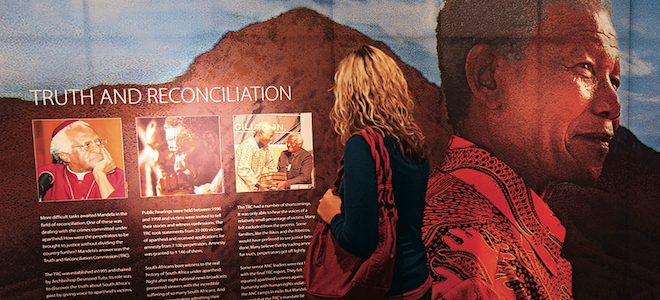Shame, blame and race in South Africa
Debate rages after a writer implores white South Africans to be politically silent
Share

White people should “just shut up and listen.” That’s the idea behind white South African writer Gillian Schutte’s recent opinion piece, “Dear White People,” which is being hotly debated in South Africa. In it, she advises white South Africans to “wake up and smell Africa with a fresh white nose,” reflect on what it means to be “born into unearned privilege” and stop “telling everyone who is not white how to behave, what to think and when to say what.” Schutte’s post, published online by South Africa’s Mail & Guardian newspaper, is rekindling the so-called “whiteness” debate in the country—that is, how to be ethical and white in post-apartheid South Africa.
Schutte’s controversial opinion that whites must be quiet is rooted in a theory promoted by a group of mostly white South African academics known as the “anti-racists,” who say the best way to deal with white privilege—sometimes called “whiteliness”—is to be politically silent.
The debate began in 2010, when Samantha Vice, a philosophy professor at Rhodes University in Grahamstown, encouraged a white retreat from South African politics. “Our thoughts are heavy with whitely assumptions,” she wrote, “and so they would be morally risky, at best, to utter publicly in as racially charged a space as South Africa.” Vice says it is “morally appropriate [for South African whites] to accept and live with shame.” Her paper, rewritten in a newspaper column by a fellow academic, went viral.
“Sam got some vociferous responses,” says Ward Jones, an associate professor of philosophy at Rhodes University, “but I think most have been sympathetic to the shame issue.” Whites are “morally unlucky,” explains Jones—“you’re unlucky in that you are part of a group that has committed great wrongs.”
Other academics began holding seminars with themes like “Shame for being white: sorting through the reasons” and “The unbearable whiteness of some beings.” Lucy Allais, a philosophy professor at Wits University in Johannesburg, wrote that if a person belongs to a group that did “something atrocious, a certain kind of strident self-righteous tone in moral criticism should be avoided.”
Critics say the theories are vacuous. “This activism by white liberals generally functions to reproduce racism,” says Andile Mngxitama, a black consciousness activist who believes whites talking to whites is futile. Others dismiss the premise of white privilege. The FW de Klerk Foundation, a non-profit organization in the name of the last Afrikaner president, wrote a response to Vice’s article arguing “a substantial proportion of whites cannot be described as being ‘privileged’ at all.”
Still, Jones says the whiteness debate will continue. “South Africa has been made by white people, and the place needs to be remade by black people,” he says. “You ask yourself, ‘What are you doing for this place?’ Especially as a white person.”